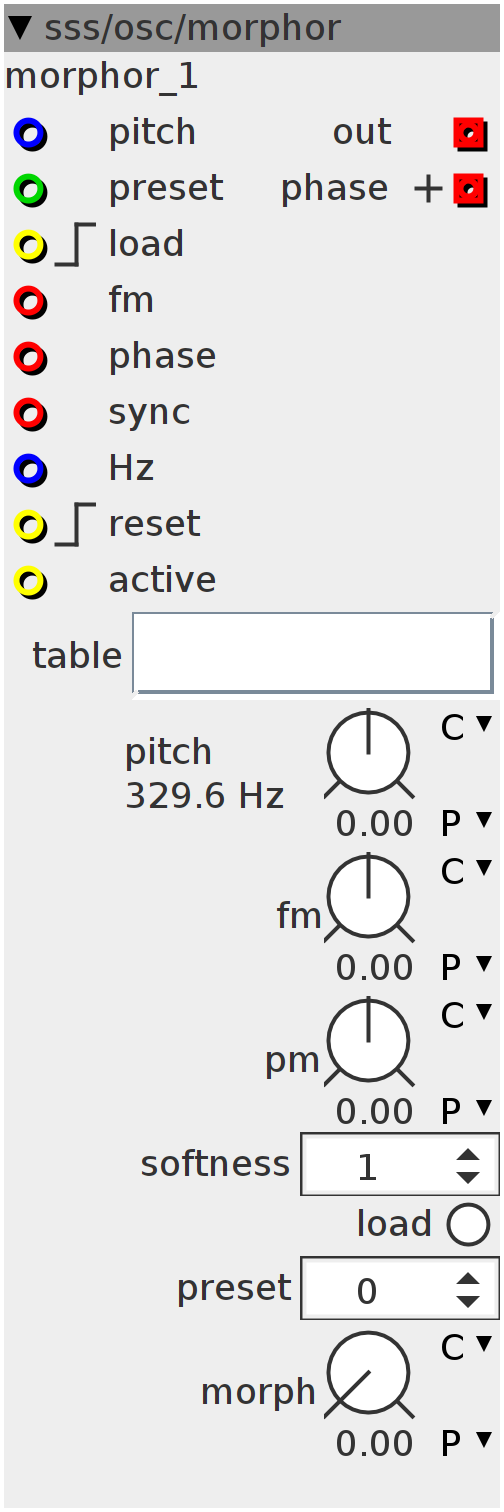morphor
based on the sculptor, but without the editing parameters. First make a wavetable (or load a previous designed wavetable), then load the table into the module. If there is no wavetable, there won't be a sound! Also, instead of a "lowpass morphed" change between presets, this uses an internal LFO to update the two tables to the currently selected preset-value and to morph between them using a sine-shape (thus always smooth) You can "override" the load by sending a gate high to the load input (will update one of the tables and the other one at the next trigger, over and over..etc) This is useful, since the tables are updated by the LFO and it might take a while before the first trigger is send to update the table from a preset. An extra phase-output (also in the sculptor) is added that you can use for adding shaped signals to the wavetable sound (eg use one of my phase-shaper modules). NOTE!!! Don't forget to add the table allocation module and set the name to a table that you have recorded to! If you haven't made a wavetable yet, by using the sculptor, you won't hear a thing!!!!!!!!
Inlets
frac32buffer connect external signal to do FM
frac32buffer connect external signal to do PM
frac32buffer connect external signal to sync waveform at positive zero-crossing
bool32 active
frac32 pitch
frac32 Hz
int32 connect to some pattern generator?
bool32.rising when load goes high, loads current preset-"input+parameter"
bool32.rising reset
Outlets
frac32buffer out
frac32buffer.positive phase
Parameters
int32 LP-filter
int32 sets preset to load from/save to.
bool32.mom loads selected preset to current waveform
frac32.u.map morph rate when new preset is selected.
frac32.s.map.pitch controls oscillator pitch
frac32.s.map controls frequency modulation width
frac32.s.map controls phase modulation width
Attributes
objref table
int32_t array[1024];
int32_t arrey[1024];
int i;
int loop;
int ntrig;
int atrig;
int xtrig;
int strig;
int ctrig;
int itrig;
int ftrig;
int trhg;
int trgg;
int32_t sine;
uint32_t phase;
uint32_t phose;
int32_t sum;
int32_t sam;
int count;
int caunt;
int ceunt;
int ciunt;
int32_t vol;
int32_t vel;
int32_t vul;
int32_t vil;
int save;
int loadA;
int loadB;
int next;
int LoadA;
int LoadB;
int LOadA;
int LOadB;
int32_t LOAdA;
int32_t LOAdB;
int LOAD;
int trip;
int32_t morph;
int32_t mot;
int32_t ccomp;
int tok;
int32_t x;
uint32_t Phase;
uint32_t r;
uint32_t h;
int trg1;
int trg2;
int trg3;
int trg4;
int32_t prevA;
int32_t prevB;
int32_t preset;
int32_t wave;
int32_t Sin;
int32_t fine;
int32_t mos;
int32_t frq;for (i = 0; i < 1024; i++)
(array[i]) = attr_table.array[i + (0) * 1024] << attr_table.GAIN;
(array[i]) = attr_table.array[i + (1) * 1024] << attr_table.GAIN;
{}
phose = 0;
vil = 0;
vel = 0;
vol = 0;
vil = 0;
LoadA = 1;
LoadB = (1 << 27);
Phase = 0;
r = 1;if (inlet_active > 0) {
preset = param_preset + inlet_preset;
if (inlet_reset && r) {
Phase = 0;
r = 0;
} else {
if (!inlet_reset)
r = 1;
Phase += ((inlet_Hz + (param_morph >> 4)) / 44 * 30);
}
wave = (Phase >> 5);
trg1 = (wave > (1 << 26)) ? (1 << 27) : 0;
trg2 = (1 << 27) - trg1;
LOAdB = trg1 * (trg3 == 0) ? (1 << 27) : 0;
LOAdA = trg2 * (trg4 == 0) ? (1 << 27) : 0;
trg3 = trg1;
trg4 = trg2;
SINE2TINTERP(Phase - (1 << 29), Sin)
fine = -(Sin >> 5) + (1 << 26);
if ((LOAdA > 0) && (!(trhg))) {
trhg = 1;
for (i = 0; i < 1024; i++) {
(array[i]) = attr_table.array[i + (preset)*1024] << attr_table.GAIN;
}
} else if (!(LOAdA > 0)) {
trhg = 0;
}
if ((LOAdB > 0) && (!(trgg))) {
trgg = 1;
for (i = 0; i < 1024; i++) {
(arrey[i]) = attr_table.array[i + (preset)*1024] << attr_table.GAIN;
}
} else if (!(LOAdB > 0)) {
trgg = 0;
}
LOAD = __USAT(param_load + inlet_load, 28);
if (((LOAD) > 0) && (!(trip))) {
trip = 1;
next = next > 0 ? 0 : 1;
if (LOadA > 0) {
next = 0;
}
if (LOadB > 0) {
next = 1;
}
if (next == 0) {
LoadA = LOAD;
LoadB = 0;
}
if (next == 1) {
LoadB = LOAD;
LoadA = 0;
}
} else if ((LOAD) < 1) {
trip = 0;
}
if (((LoadA) > 0) && !loadA) {
loadA = 1;
for (i = 0; i < 1024; i++) {
(array[i]) = attr_table.array[i + (preset)*1024] << attr_table.GAIN;
}
}
if (!((LoadA) > 0))
loadA = 0;
if (((LoadB) > 0) && !loadB) {
loadB = 1;
for (i = 0; i < 1024; i++) {
(arrey[i]) = attr_table.array[i + (preset)*1024] << attr_table.GAIN;
}
}
if (!((LoadB) > 0))
loadB = 0;
mos =
___SMMUL(((1 << 27) - param_morph) << 3, ((1 << 27) - param_morph) << 2);
mos = ___SMMUL(mos << 3, mos << 2);
MTOFEXTENDED(param_pitch + inlet_pitch, frq)
}if (inlet_active > 0) {
int32_t FMW = ___SMMUL(param_fm << 3, inlet_fm << 2);
if ((inlet_sync > 0) && (!(tok))) {
phase = 0;
tok = 1;
} else {
phase += frq + ___SMMUL(frq << 6, FMW << 3);
if (inlet_sync < 0) {
tok = 0;
}
}
phose = phase + ___SMMUL((inlet_phase << 5), param_pm << 5);
outlet_phase = phose >> 5;
phose = phose >> 22;
// phise=(phose<<16);
sum = array[phose];
sam = arrey[phose];
morph = morph + (___SMMUL(((next << 27) - morph), mos));
ccomp = (1 << 27) - fine;
mot = ___SMMUL(ccomp << 3, sum << 2) + ___SMMUL(fine << 3, sam << 2);
vil = vil + ((mot - vil) / param_softness);
vol = vol + ((mot - vol) >> 15);
vel = mot > 0 ? mot : -mot;
if (vel > vul) {
vul = vel;
} else {
vul = vul * 0.9999;
}
outlet_out = vil;
}